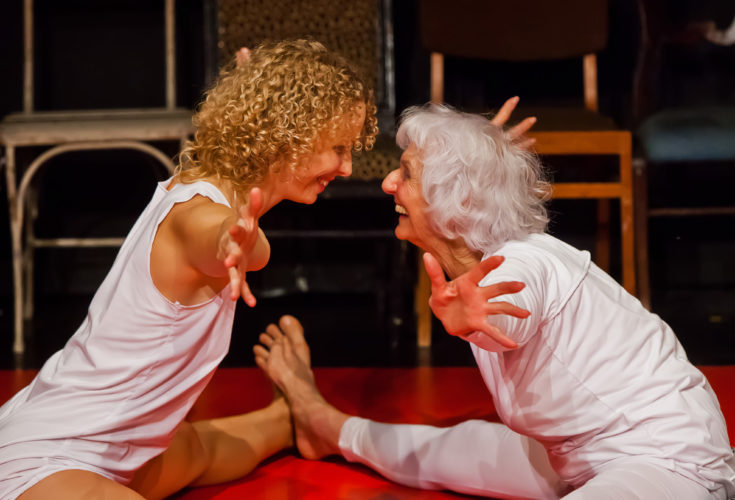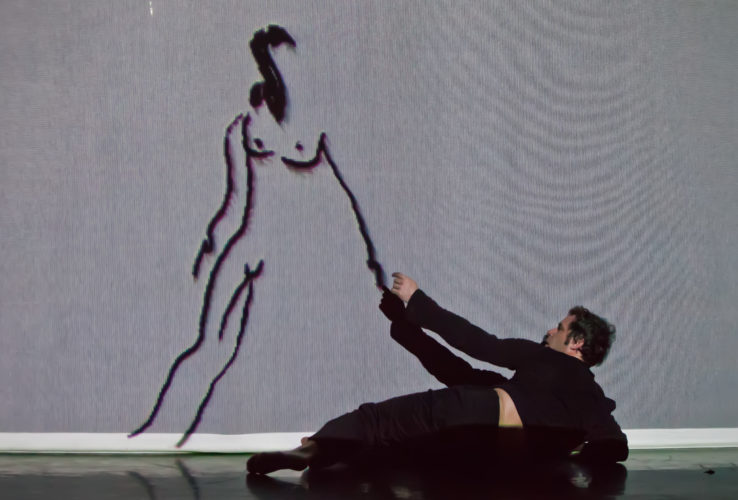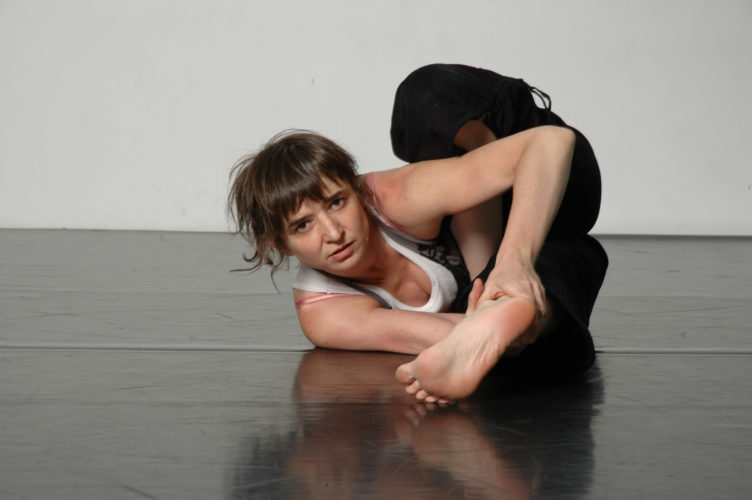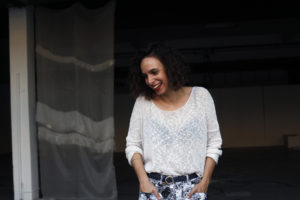Hungary 2017. The political is taking over the independent performance scene in ways that re-route artists’ priorities, concepts and mere existence. While the 2000’s were resourceful years, 2010 marked severe cuts for Hungarian contemporary performance when it comes to the independent scene. I talked to Réka Szabó, the artistic director of The Symptoms, in their headquarters at Juranyi House in Budapest. The discussion evolved organically to topics that concerned us both, in the presence of Flóra Kovács, the current international relations manager of the company. Réka shaped evocatively the rises and falls of her company, almost like a piece in which the performer cannot stand still for more than 5 minutes. Sometimes life takes over, sometimes it’s the economy, politics or artistic dilemmas.
You were saying that creating a company sometimes means creating a closed circle.
In 2004 we created a piece where I first worked with actors and dancers mixed and somehow it was such a great process, we came up with a language on stage and with work we found really interesting, so I just thought that this should be continued. It was not just ”OK, I did a work and now I do another one” but it’s a kind of “I want to continue with this thinking and to go deeper with the experimenting”. What if we create a company? I asked them. Without anything, without money, we didn’t have anything, really nothing. But it was a great period because this amazing enthusiasm and really hard work made us successful, we somehow met with the audience. I don’t know about Romania, but I always feel that dance is something contemporary, people are like “What is this, I don’t understand, I can’t verbalize”. And, in a way, these weird pieces were communicating with the audience, it was the verbal help, I used text and movement together, it was funny and dramatic, so there was something constructing this bridge. We started to apply as a company for money and then we built it up step by step.
Was it just you, applying?
At first it was just me. I was doing Everything. And then I said “I can’t do it”. We started having more and more performances, more money, more opportunities, I couldn’t do it, it was too much. But still we didn’t have enough money to pay a producer, so I had some help, unprofessional, a lot of energy for these unprofessional connections, these kind of problems that I know everybody goes through when one doesn’t have money. Maybe the change came with the professional manager, who was managing a quite well-known Hungarian dance company. She left this company and after a while she offered… to The Symptoms. We learnt a lot! At that time we didn’t even have a name, for example, we didn’t have a logo.
So she branded you.
Yes.
How was the encounter with this professional producer?
She came to watch us, half year before, at Trafo, she went to one of our dancers and asked “Who is the manager of this company, because it’s great”, she wanted a contact. He told her that we don’t really have a manager. And this stayed in my mind. So when I heard that she left the other company, I asked her whether she would join us. She said yes.
In what way did things evolve after the joined?
She brought a lot of changes, we made a step to become more professional, we found our name, The Symptoms, and we had a logo, we created a website, and this was the first time our money from the ministry had a jump. First it was very small, then small, then a little bit more, but still very small, then she came and it was a jump in the money and also in the possibilities.
Which were these new opportunities?
It’s hard to put together but for example we made a cooperation with a stone theatre. We say stone theatre for state theatre. Thalia. The collab was independent from our producer, but in a way all things came together, artistically, management wise, international tours. I don’t know if it was all because of her, or because it was a very successful period for the arts, but everything came together.
Did she create a strategy, did she complete your vision?
Yes, she had a great eye to watch from a distance. She had structure, aims, she could clarify things. She would tell me “What do you want? Decide. This or that? You cannot do both.”
Was it just you that learnt from her, or was it that both of you grew together profesionally?
I think I learnt a lot from her, from the management and the structural side.
Why isn’t she with The Symptoms anymore?
It was like… I got pregnant. That was life in the life of the company.
The company was dependent on you?
I was the motor.
Was anyone else directing apart from you?
Not really. We had guest directors, occasionally we invited other creators, but most of the time it was me who created the pieces. Now there are only 4 artists besides me who get regular salary, two of them are the base, they are here from the beginning. I have a very long and strong relationship with these two guys, but in a way, the center and the motor of the company it’s me.
Let’s go back at the moment when you became pregnant.
When I got pregnant she left. I think she wanted more money, she didn’t see the long-term perspective. She left the field. She continued training, coaching, professional training for managers. She’s a very clever woman. Yes! We are still in contact and we talk a lot but she changed her life. She wanted to earn money, have children, so she decided to leave the field.
What happened at that point to the company?
I created a piece when my baby was one and a half, a coproduction with one of the best state theaters in Hungary, so I still had these possibilities but it was very hard to manage it, having a child. It was 2008 when I gave birth and then in 2010 there were these… changes. This populist government came, so everything collapsed. Money became lower. I had to send home half of the company, I couldn’t pay their salaries anymore. Every day something new happened, it was so annoying and so unacceptable, what is this word when you cannot do anything? I though we lived in a democracy and then I realized we did not, they can do anything they want.
Did anyone in the artworld put resistance to the current government?
Yes, but very little. It was Arpad Schilling. There is this independent association for the performing arts scene, FESZ. He was the director of this association for 1 year, and he was amazingly active, I felt that year that the whole scene somehow came together and made protests. I had the feeling that when you go to the corner shop they know what independent theatre is, it became very popular. All the newspapers and the media were dealing with our problems. Our money was cut drastically and the government, who’s a populist government… well, we succeeded to go exactly in the area that they were frightened of.
Did your artistic methodology change when the producer left?
I started with those pieces mixing actors-choreographers and after a while I felt stuck. It was a hard period, not only because of the circumstances but it all came together: the child, half of me was there, all these system changes, everything became very uncertain and artistically I didn’t find my voice. But now for a few years, I think, something started again, it goes into the right direction.
In what sense?
There was a point when I didn’t know what to do, to give it up, because it was very hard, I felt it sucks out of me more than I get back, I was tired, exhausted, nothing successful, everything excessively hard, nothing worked. I couldn’t really tell if it’s an inside or an outside factor, or both. I decided to take a residence, just for myself and leave everything. It was in Brussels, I went there for 2 weeks, to have time for myself, something which I never had for a long time. I had that constant feeling, that I cannot give enough time to my baby, that I don’t give enough time to my company, but where was I? It’s a typical burnout story. It was me who was not important in that equation. So I stared to give time for myself. It was a turning point. I did a solo. It was long since I had last been on stage. I was outside and I put more and more responsibility for the performers, where was my responsibility? It was a very important point.
What came out artistically after you gave birth?
“The meaning of life”. Actually it was the first piece I did after the baby, I would say that it isn’t a good piece, but it’s absolutely radical. 5 performers on stage and the audience get headphones and live music, and the performers do actions, physicality and constant monologue. The audience could change the channel. You see chaos on stage, each performer with their own channel, and the public could focus on what they want to follow. There was another part, the birth part, at the begging, where I spoke about a dream. I was still breastfeeding. And at the end of this I say “There is somebody that I want to die after me”. I could not say this sentence before I had my child. I never had this thought before. But after birth it just came to my mind. So, in the show, after this monologue, I was milking my breasts, put the milk into a glass and offered it to the audience. I told them I have to drink a lot of water in order to breastfeed. And now a lot of people are running out there with my milk.
How is a child possible for an artist?
Very hard, very difficult. In a way I have the feeling I cannot put away the company for a little while, for 1-2 years, because then you lose everyone, the opportunities, everything. They tried to prepare for this period, share responsibility, delegate tasks. But my energy was a big lack. It’s hard. Do we know any other woman who is an independent artistic director and has a child? Not really. They don’t have a family or a partner. It’s very few artistic directors of companies – in the dance field is more common – that are women. It’s very hard to be a woman and reach that point and also have a child. It’s very hard.
The Symptoms perform weekly one of their shows, in Budapest at Trafo, Mu, Juranyi House and across Hungary in various festivals, so if you are around go check them out.
Ioana Păun’s residency was possible with the support of AFCN, Artportal.hu, The Hungarian Institute in Bucharest and ICR Budapest.
POSTED BY
Ioana Păun
Ioana Păun (b. 1984, Romania) is a feminist director working and researching internationally, having graduated from Goldsmiths University London and UNATC Bucharest. Her work explores the ways humans...
ioanapaunlive.wordpress.com/




Comments are closed here.